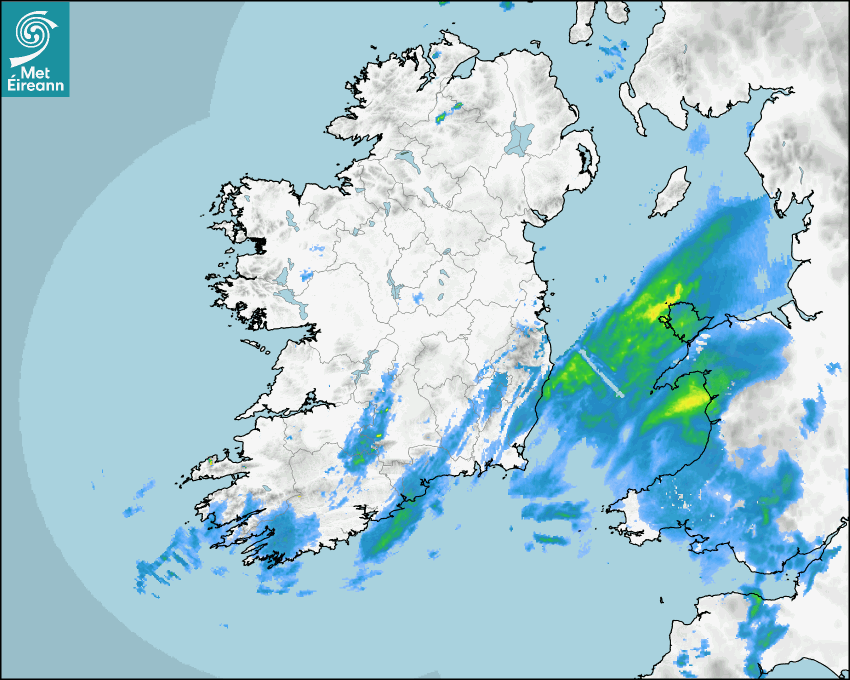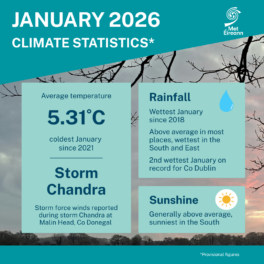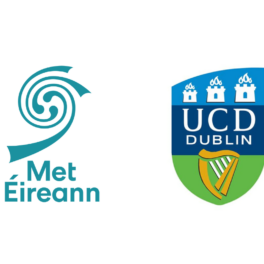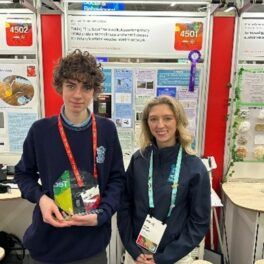
Latest Rainfall Radar showing live precipitation and the last 90 minutes precipitation over Ireland, updated every 5 minutes. Precipitation can be rain, hail or snow. Accumulations can refer to rainfall only.
Lightning strikes, when they occur, are displayed as a cross. Initially, they are red but change to orange and then yellow after a period, then disappear © Met Office ATDNet.
Ground Clutter may appear (South Co. Dublin), bright bands and spokes may also be present in images. They are artefacts (false echoes) of rainfall radar systems and should be ignored. Further information on Radar here
Met Éireann forecasters manually produce the weather icons for midday and midnight to reflect the predicted major weather type for these times.
The rainfall forecast is direct model output from Numerical Weather Prediction models but is a guideline only. Rain refers to precipitation, which can be rain, sleet or snow. It forecasts how much rain will fall (in mm) hourly during the previous hour (accumulations), then in 3 hourly and finally 6 hourly accumulations up to 7 days. This service is based on data and products of the HARMONIE-AROME and the European Centre for Medium-range Weather Forecasts (ECMWF) models.
The wind is direct model output from Numerical Weather Prediction models but is a guideline only. It forecasts the strength of the wind (in knots and km/h) at 10m for the top of each hour, in hourly, then 3 hourly and finally 6 hourly intervals up to 7 days. The wind arrow tip points in the direction the wind is blowing and the tail length indicates wind strength. However, in the text forecast below, it is described as where it is blowing from. This service is based on data and products of the HARMONIE-AROME and the European Centre for Medium-range Weather Forecasts (ECMWF) models.
The temperature is direct model output from Numerical Weather Prediction models but is a guideline only. It forecasts air temperature on land and over sea in °C for the top of each hour, 3 hourly and finally 6 hourly intervals up to 7 days. Minus zero (-0) indicates values between 0 to -0.5°C. This service is based on data and products of the HARMONIE-AROME and the European Centre for Medium-range Weather Forecasts (ECMWF) models.
The Mean Sea Level Pressure (MSLP) is direct model output from Numerical Weather Prediction models but is a guideline only. It forecasts the MSLP in hecto Pascals (hPa) for the top of that hour initially in 3 hourly intervals, then 6 hourly. This service is based on data and products of the HARMONIE-AROME and the European Centre for Medium-range Weather Forecasts (ECMWF) models.
Réamhaisnéis Náisiúnta
26 February 2026 23:30
Inniu
<br><br>
Anocht
Mostly dry at first tonight with mist patches near western and southern coasts. Outbreaks of rain and drizzle near the south coast will push inland, returning to southern and eastern counties for a time. The rain and drizzle will clear eastwards overnight with a few showers following. Generally dry conditions will persist further west and north with just a few showers. Lowest temperatures of 3 to 7 degrees. Moderate, occasionally fresh, and gusty south-westerly winds will ease light to moderate.
Amárach
Any lingering rain and drizzle in the southeast will soon clear on Friday morning, and it will gradually brighten up with sunny spells and just a few showers. Highest temperatures of 8 to 11 degrees in light to moderate northwesterly winds.
Met News
05ú Feabhra 2026
Climate Statement for January 2026
Cool, very wet in the South and East January 2026 ... léigh níos mó
29ú Eanáir 2026
New Masters in Artificial Intelligence for Weather and Climate Change launched
A new MSc programme co-delivered by Met Éireann a... léigh níos mó
13ú Eanáir 2026
Met Éireann presents two awards at action-packed Stripe YSTE
Met Éireann was once again delighted to take part... léigh níos mó



